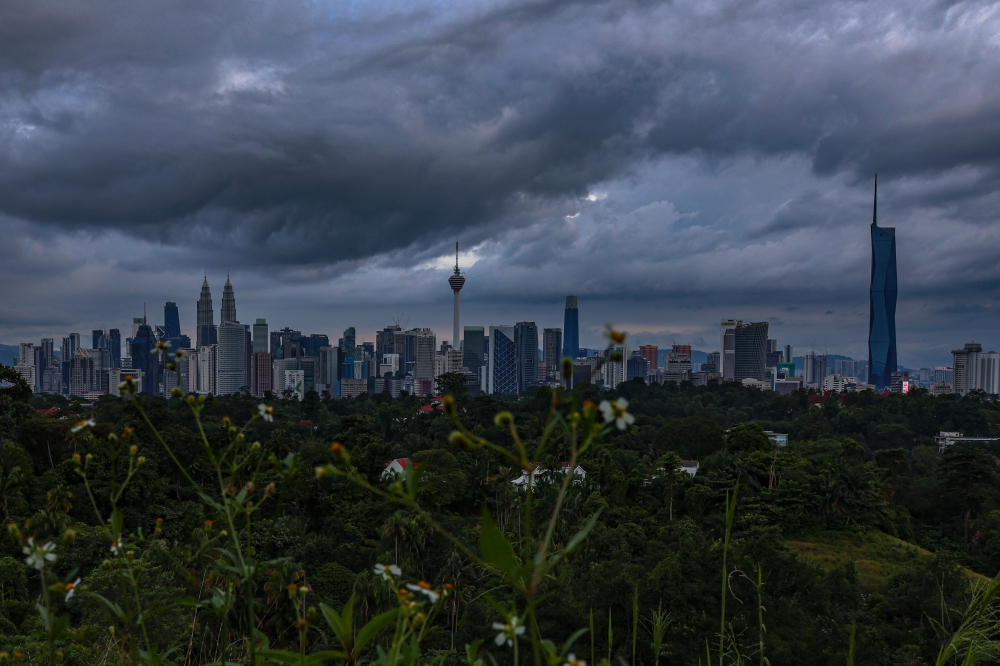OCTOBER 7 ― It is painful when an adult dies from Covid-19 but it is tragic when it happens to a young child; especially when this occurs from a preventable cause.
While serious illness and deaths due to Covid-19 is uncommon among children, when the outbreak is very large, as occurring now, some children will sadly succumb. We need to be concerned for those children who are immunocompromised, malnourished, in poverty and have chronic disease.
This recent infant death will have alarmed parents and those of us working with children. We want to know how we can protect our children better. The clear message is that we cannot protect our children without controlling the pandemic in the community; these two are intricately linked. I would like to offer some suggestions of what we can do in the face of the extensive community spread that is currently occurring in the country.
Support each other
The deep strength that Malaysians have always had is, that in times of crisis, we unite, put aside our differences and support each other. If you want to protect your child you need to support other children and families; the concept of #RakyatJagaRakyat. Many are struggling with limited resources. They may attend the same schools as our children. Their parents may visit the same shops or supermarkets as us. We may share the same airspace in offices and lifts and buildings; some of them are cleaners or security guards or cook our meals at coffee shops. The time now is not to be biased towards migrant workers or the poorer segments of our society. They live in more crowded environments and have less ability to maintain good Covid-19 measures; they may reuse masks and not be able to afford hand sanitisers. Let us work together to share our resources with them. Buy or make masks for them; give away alcohol-based hand sanitisers; share food items and money. This pandemic will only be won if we work together as one people.
Improve SOPs at schools, taskas, child care facilities
Many parents are understandably worried about sending their children to any child facility or schooling environment. But we cannot keep these shut repeatedly. Many children rely on school meals for vital nutrition. For others school is a refuge from abuse at home. Children with disabilities need the intervention to make progress. A sizable proportion of children have no online access to study at home. The developmental and educational needs of children have been impaired by the various movement control orders (MCOs). Hence it is critical to improve standard operating policies (SOPs) at schools and other facilities where children go to. Many parents have spoken to me about the poor SOPs in our schools, especially (but not restricted to) Ministry of Education schools. Mask wearing and physical distancing is almost non-existent in some, even for teachers. These are unsafe environments in the face of the Covid-19 pandemic. You cannot wait for fresh outbreaks in your area to enforce these measures. These have to become routine, daily activities. Teachers and child care staff must model this constantly and have high standards of Covid-19 prevention measures. At times individual schools may have to be closed, but by and large we can allow our children to go to school if the education authorities can show us we can trust them and the schooling environment.
Strengthen our contact tracing with data transparency
Data transparency has always been poor in Malaysia and Covid-19 has continued to show this sad reality. What we all need as the public is to know exactly where infections have occurred and if we have been in contact with that person (airborne contact) or location (surface contact). The current electronic application systems are limited in their functionality. It is a herculean task (superhuman task) for the public health staff to even trace all the contacts of one person, like our recently infected minister who met thousands, often without a mask. Asking people to sign in does not work effectively as some do not comply and others use paper mechanisms. Seamless and continual contact tracing is possible and we need to make use of this technology. Google and Apple have collaborated to make available Privacy-Preserving Contact Tracing using Bluetooth technology to help governments and health agencies. Some will be concerned that “big brother” will be watching us but Google and Apple have collaborated to make it privacy-preserving.
In the past this required governments to build their own apps to take advantage of this feature but the uptake was poor. Now Google and Apple have put in place Exposure Notification Express and integrated it into the basic operating system, and it does not require additional applications. Alerts would be sent automatically to those who had recently been nearby a positive person. Privacy is maintained but health authorities still have to be involved to identify the index case and alert the system. If we choose not to do this we must significantly improve our current application and bring it to the functionality as existing in the Covid-19 tracking apps available in Switzerland and Ireland; but even then it will only work if people download them. While we work on this, we require a significant improvement in data transparency and sharing by our authorities. This pandemic will not be managed by a few holding on to the data but by many working together to support analysis and stem the tide. In addition if a public figure is found positive, it is critical to announce this as soon as discovered in view of their extensive contact with and potential spread to others.
Advocate for health support to be ramped up
This is harder for us to do as a society but we can advocate individually and collectively for health services to grow to manage outbreaks. At the beginning of the epidemic we saw a significant input in this area but with time we have lost the impetus and momentum to grow our response capacity. We must advocate for more financial, manpower and equipment resources for the Ministry of Health (MOH). A quick summary of what is needed and what we should push for is itemised below:
1. Our testing capacity after 9 months has stagnated at approximately 40,000 RT-PCR tests. This is grossly inadequate, especially as we often do not use the full quota of tests available and the turnaround time for testing is still slow (can take 3-4 days). RT-PCR testing capacity and speed must be scaled up dramatically.
2. We need to supplement testing using rapid antigen detection tests. They may be less sensitive but offer results much faster. When we require almost immediate results, like at airports/borders or when outbreaks grow rapidly in closed communities like prisons, then point-of-care testing using antigen tests is very useful. They should also be made available to our general practitioners (GPs) to use. We are not adequately enlisting the support of our GPs to help with testing and screening. They can do this by car-drive pass testing to avoid clinic contamination.
3. MOH needs a boost in manpower. There must be the availability of rapid, mobile teams to support areas which are facing larger outbreaks. Our healthcare staff in these areas are facing burnout and need this “adrenaline” boost of resources. It is depressing to note that the government has still not offered permanent posts to thousands of doctors and pharmacists. The job uncertainty does not enable these staff to work well and others may “snap them up”.
4. MOH needs a huge injection of funds to continue to buy more intensive care and monitoring equipment, upgrade critical care facilities, build makeshift wards and quarantine facilities, and stockpile more personal protective equipment (PPE). We know from experience that quarantine at home does not work as well as at designated centres. We cannot say funds are limited as not spending here will bring the whole economy down. We must do this now and not wait for capacity to be overrun.
We on our part as society can also continue to support our local health and hospital staff.
Poor leadership by example hampers population compliance
Finally, and perhaps the most important, leadership by example is lacking. We expect elected representatives to rise to the challenge of dealing with this pandemic by first leading by example. What we have is a near absence of leadership by example and obvious double standards. We have all seen hundreds of images and videos of our elected representatives breaking SOPs with no consequences. Poor leadership by example hampers population compliance of effective measures. Inconsistent SOPs (double standards) significantly impairs control measures. The public needs to see one standard enforced in the country, irrespective of status.
It is a reality that we will only overcome this epidemic if we work together. The majority of the people are ready and willing, but our leaders need to come on-board. Please let us not enable the virus to kill more children and adults by our failure to act right.
* This is the personal opinion of the writer(s) or organisation(s) and does not necessarily represent the views of Malay Mail.





















